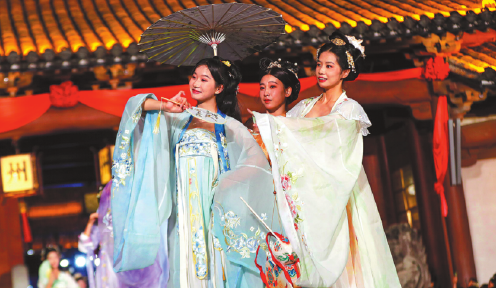Awakening a passion for the past
As they reconnect with tradition, the country's young are finding creative new ways of expression

Huo Deyu patiently makes a headpiece and props for a character she is about to imitate online, before beginning on her makeup. When she puts everything on, magic happens, and in an instant Huo transforms into the likeness of the painted statue of a goddess.
As part of the resurgence of interest celebrated online as "ancestry awakening", Huo is among a growing cohort of young Chinese embracing their traditional culture, a heritage that dates back thousands of years.
The 29-year-old university dance major from Jiangsu province has been sharing such transformations on social media for about four years, and now has 530,000 followers on lifestyle platform Xiaohongshu. Her latest videos, which include her imitations of painted statues from Yuhuang Temple in Shanxi province, were filmed following the temple's surge in popularity after its appearance in the recent video game, Black Myth: Wukong.
"I was fascinated by the costumes of the statues and the mysterious nature of the characters, and was inspired to study these ancient artworks," Huo says, adding that she found great joy in the process.
Her transformation videos are especially popular, averaging over 1 million views.
Huo has long had an interest in Chinese culture and began learning traditional dance when she was 4.
She has even gone so far as to learn how to make velvet flowers, a listed form of intangible cultural heritage in Jiangsu.
"Compared to our parents' generation, we started to learn about traditional culture at a relatively early age," she says. "We no longer see it as something only found in museums. Rather, we want to feel traditional culture and breathe new life into it."
Huo says that she is not alone in her love of combining traditional culture with modern elements, and speaks of the rising availability of cultural products that appeal to the masses.
Love and tolerance
According to a China Youth Daily poll last year, 85.8 percent of the 1,000 young respondents said they believed that intangible cultural heritage has gained in popularity in recent years. Asked how they learned about traditional culture, 53.3 percent of respondents said they chose to watch shows, and 50.4 percent said they opted for museum visits. Interest in buying creative cultural products was expressed by 40.5 percent of respondents, with 31.9 percent saying they would like to take part in cultural activities.
The TV show, Chinese Poetry Competition, has been captivating audiences for years. Contestants come from all walks of life, with scientists, students, delivery workers, police officers and pilots all trying their luck, a testament to the accessibility of classical poetry.
Traditional attire, or hanfu, is also enjoying a resurgence, with hanfu rental and photography stores popping up all over the country. Farther afield, it is possible to see Chinese people playing traditional folk instruments on the streets of London, Paris, Sydney and other major metropolises.
In line with this rising popularity of traditional culture, clubs and groups have mushroomed. Zi De Guqin Studio, a band whose members play traditional Chinese instruments, is among the most successful examples.
The band was formed in 2014 and most of its members are in their 20s. It has gained national fame in recent years, after they appeared on the Mid-Autumn Festival Gala dressed in hanfu.
Though their work focuses on their love for traditional Chinese culture, the musicians say this doesn't mean they reject other cultures.
Band member Wang Muyu is a 24-year-old student at the Shanghai Conservatory of Music, who plays the violin and the pipa (a four-stringed Chinese lute). Equally interested in Western culture, she says both instruments pull on her heartstrings."The emotions of all human beings are connected."
Some of the songs the band enjoys playing the most are combinations of Chinese and Western elements, she says.
Music from the Harry Potter films, The Phantom of the Opera, and the Doraemon anime series are all part of their repertoire."They are welcomed by our audience, who interact energetically with us when we play them," she says.
The band has also performed overseas, in countries such as Japan and Malaysia, where they have been welcomed. "They are curious and ask us a lot of questions," Wang says."And the Chinese people there are touched to see the culture of their home country."
Confidence, increased exposure
Zhu Liyue, who fronts the band, believes that newfound love of the young for traditional culture stems from confidence in their country.
"They are living in an era when China is strong and moving toward rejuvenation," he says, adding that people in a more developed China are able to produce better products to promote their culture.
His view is shared by Zhang Yiwu, a cultural studies professor at Peking University who believes that the passion of the young for traditional culture indicates the relative stability, wealth and prosperity of today's society — which is different to the one their parents knew, when people had to work harder to make a living.
"Foreign language skills have also improved greatly, which enables young people to learn about other cultures," he says. While young Chinese show an interest in Western culture through foreign literature and cinema, they feel a deeper connection to Chinese culture, which is woven into their upbringing.
Traditional culture now has a lot more exposure thanks to social media, movies and TV dramas, and with cultural elements incorporated in important occasions — like the opening ceremonies of the Beijing Summer and Winter Olympics, and in the national uniforms of Chinese athletes — young people are inspired to learn more about their culture.
Many are also working in jobs related to the promotion of traditional culture and enjoy good prospects, Zhang says. "This is both a result of their love for their culture and a response to this social trend," he says, adding that they go on to inspire others in a virtuous circle.
According to the National Bureau of Statistics, China's cultural industry and related industries contributed nearly 5.38 trillion yuan ($737 billion) — or 4.46 percent — of the country's gross domestic product in 2022.
Capturing with culture
A group of young people in Changsha, Hunan province, is working to promote traditional handicrafts using a profitable business model.
Their company, Cicada Modern Culture Co, began by making documentaries about artisans, many of whom practice traditional crafts that have been recognized as intangible cultural heritage. When their series, The Great Shokunin, premiered in 2016, it became an instant hit, attracting university graduates like Dai Lyuxia, who is now 29, to join their ranks.
"I was captivated by the elegant aesthetics in the series," says Dai, who studied journalism, as she reflects on what inspired her decision. She is now six years into her job as e-commerce team leader with Cicada Modern Culture. "It's both my profession and my passion."
The company now encompasses video content creation, the sale of handicrafts and other intangible cultural heritage commodities on e-commerce platforms, and the offline marketing of creative museum souvenirs.
Last year, Dai traveled to Yangjiabu, a remote village in Shandong province famed for its traditional New Year woodblock prints, to select something to sell during the Spring Festival.
She remembers seeing art shops flanking the streets, and very few tourists, and sifted through countless prints before one caught her eye. "It was of a fictional money tree, symbolizing wealth, and was decorated with colorful images of bronze coins and treasure-filled basins."
Her team designed elegant packaging for the prints, filming a series of promotional vlogs and creating social media posts featuring images and illustrations of it to ensure ample exposure.
In the course of the last year, they have sold 15,000 prints, grossing 1.5 million yuan, the majority of which is paid to the artists.
"Everyone here loves traditional culture, and we have the passion to understand it and promote these products to more people," she says.
Huo, who continues to post her creative imitations on social media, is also passionate about popularizing traditional culture. "The strength of our country provides a solid foundation for the revival and passing on of traditional culture, and our ancestral treasures deserve more attention and love from the masses, so they can hand them down for thousands more years to come."
Xinhua


Today's Top News
- UN envoy calls on Japan to retract Taiwan comments
- Innovation to give edge in frontier sectors
- Sanctions on Japan's former senior official announced
- Xi stresses importance of raising minors' moral standards
- Coordinated reform key to country's growth
- Shandong gives new life to traditions





























